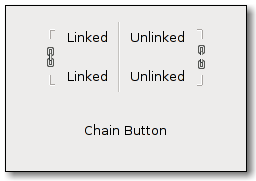| Top |
Functions
| GtkWidget * | gimp_chain_button_new () |
| GtkIconSize | gimp_chain_button_get_icon_size () |
| void | gimp_chain_button_set_icon_size () |
| void | gimp_chain_button_set_active () |
| gboolean | gimp_chain_button_get_active () |
Properties
| gboolean | active | Read / Write / Construct |
| GtkIconSize | icon-size | Read / Write / Construct |
| GimpChainPosition | position | Read / Write / Construct Only |
Object Hierarchy
GObject
╰── GInitiallyUnowned
╰── GtkObject
╰── GtkWidget
╰── GtkContainer
╰── GtkTable
╰── GimpChainButton
Description
This widget provides a button showing either a linked or a broken chain that can be used to link two entries, spinbuttons, colors or other GUI elements and show that they may be locked. Use it for example to connect X and Y ratios to provide the possibility of a constrained aspect ratio.
The GimpChainButton only gives visual feedback, it does not really connect widgets. You have to take care of locking the values yourself by checking the state of the GimpChainButton whenever a value changes in one of the connected widgets and adjusting the other value if necessary.
Functions
gimp_chain_button_new ()
GtkWidget *
gimp_chain_button_new (GimpChainPosition position);
Creates a new GimpChainButton widget.
This returns a button showing either a broken or a linked chain and small clamps attached to both sides that visually group the two widgets you want to connect. This widget looks best when attached to a table taking up two columns (or rows respectively) next to the widgets that it is supposed to connect. It may work for more than two widgets, but the look is optimized for two.
Parameters
position |
The position you are going to use for the button with respect to the widgets you want to chain. |
Returns
Pointer to the new GimpChainButton, which is inactive
by default. Use gimp_chain_button_set_active() to
change its state.
gimp_chain_button_get_icon_size ()
GtkIconSize
gimp_chain_button_get_icon_size (GimpChainButton *button);
Gets the icon size of the GimpChainButton.
Since: 2.10.10
gimp_chain_button_set_icon_size ()
void gimp_chain_button_set_icon_size (GimpChainButton *button,GtkIconSize size);
Sets the icon size of the GimpChainButton.
Since: 2.10.10
gimp_chain_button_set_active ()
void gimp_chain_button_set_active (GimpChainButton *button,gboolean active);
Sets the state of the GimpChainButton to be either locked (TRUE) or
unlocked (FALSE) and changes the showed pixmap to reflect the new state.
gimp_chain_button_get_active ()
gboolean
gimp_chain_button_get_active (GimpChainButton *button);
Checks the state of the GimpChainButton.
Property Details
The “active” property
“active” gboolean
The toggled state of the chain button.
Owner: GimpChainButton
Flags: Read / Write / Construct
Default value: FALSE
Since: 2.10.10
The “icon-size” property
“icon-size” GtkIconSize
The chain button icon size.
Owner: GimpChainButton
Flags: Read / Write / Construct
Default value: GTK_ICON_SIZE_BUTTON
Since: 2.10.10
The “position” property
“position” GimpChainPosition
The position in which the chain button will be used.
Owner: GimpChainButton
Flags: Read / Write / Construct Only
Default value: GIMP_CHAIN_TOP
Since: 2.4
Signal Details
The “toggled” signal
void user_function (GimpChainButton *gimpchainbutton, gpointer user_data)
Flags: Run First
See Also
You may want to use the convenience function
gimp_coordinates_new() to set up two GimpSizeEntries
(see GimpSizeEntry) linked with a GimpChainButton.

